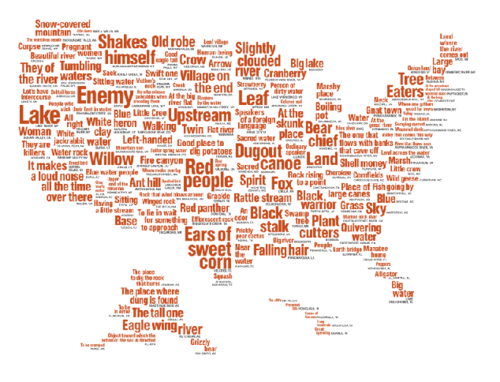
Native American words echo in the names of lakes, rivers, mountains, states, cities, and small towns across the United States. The first settlers, who put many European words on the map, also borrowed names from local tribes. They often mispronounced what they heard—that’s how the Washoe word dá’aw, or lake, became Tahoe. In some cases they changed Indian terms so much that linguists can’t identify the original language or meaning. Laypeople have often stepped into the scholarly void with fanciful interpretations that have become part of American folklore. Chesapeake, for example, is sometimes translated as”great shellfish bay.” But no one knows what the word meant to the Indians who coined it.
Most of the translations on our map reflect the best scholarly opinion on the meaning of the Indian terms. Translations are more certain in the West, and in Alaska and Hawaii, where the old languages were still spoken when linguists began to work. On the East Coast, many cultures had faded before most studies began, so some definitions represent a scholar’s best guess.
Another reminder that November is Native American Heritage Month.
We welcome your comments if you are 13 or older, and hope that our conversations here will be polite. You are responsible for the content of your comments.
We do not discriminate against any views, but may delete any of the following:
- violent, obscene, profane, hateful, or racist comments
- comments that threaten or harm the reputation of any person or organization
- advertisements or solicitations of any kind
- comments that suggest or encourage illegal activity
- multiple off-topic posts or repetitive posts that are copied and pasted
- personal information including, but not limited to, e-mail addresses, telephone numbers, mailing addresses, or identification numbers
In short: be nice and add to the discussion. If you continually violate this policy, we may limit your ability to comment in the future. If you have any questions or comments about this policy, please e-mail us.
